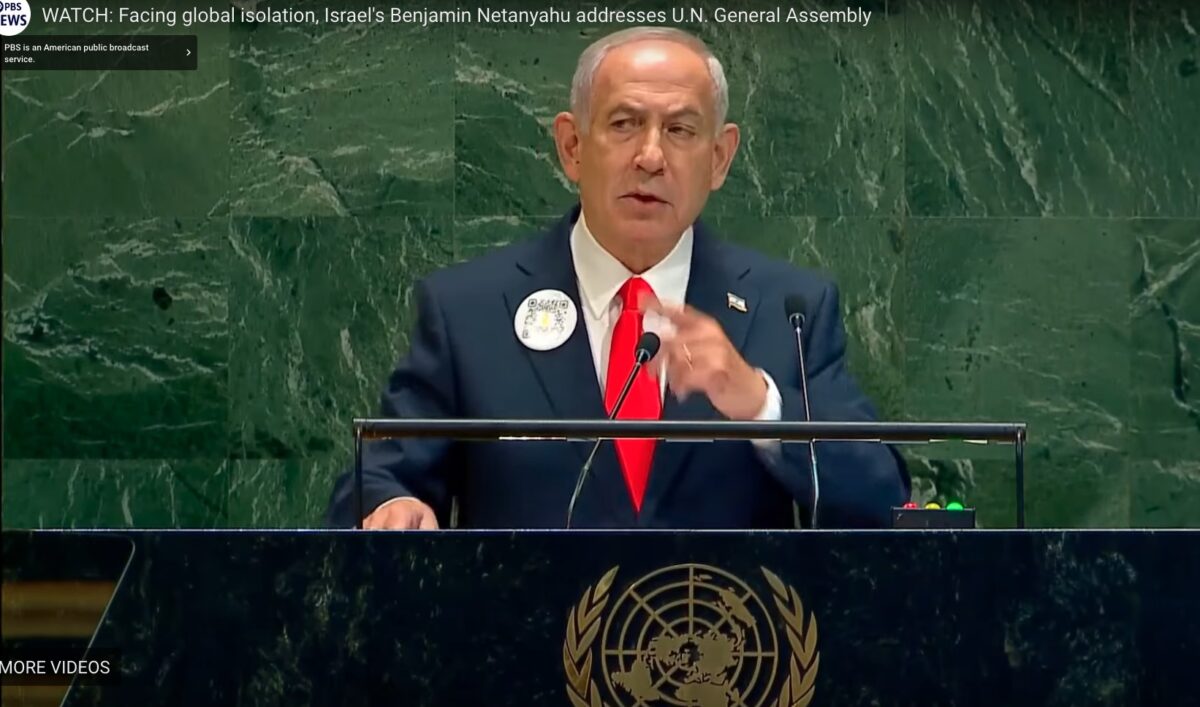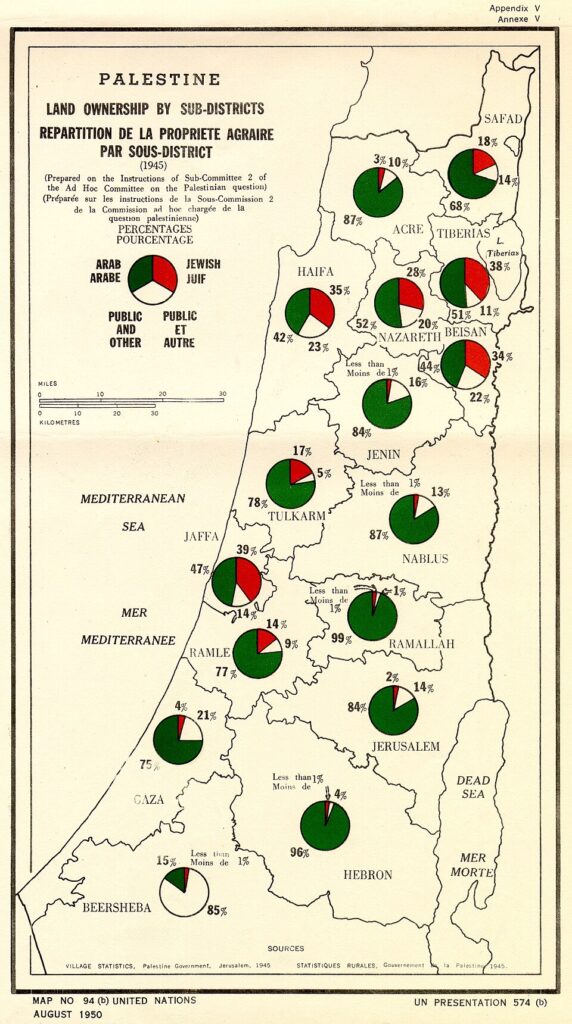On a day when an indicted war criminal and the author and Kommandant of an ongoing genocide gets to speak from the rostrum of the world’s most august and authoritative governance body… We should ask whether this tradition of coddling and endlessly appeasing the leaders of a brutal settler-colonial project in Palestine dates back, indeed, to the founding years of the United Nations and the decision an earlier UN General Assembly took in November 1947 to partition historic Palestine and assign to that small proportion of its residents who were participants in the Zionist settler project, their own independent ethno-state state and to allocate to it, moreover, a wildly disproportionate amount of Palestine’s fertile land and other resources.
Today, at a time when Israel’s government and military continue their genocide in Gaza– and their ethnic cleansing in Jerusalem and the rest of the West Bank… and their continuing aggressions against Syria, Lebanon, Yemen, and even a small unarmed flotilla of humanitarian activists– we should ask whether this two-year-long orgy of Israeli violence is now bringing down not just the global power of its main backer in world affairs (whose own foundation as a “nation” lay also, lest we forget, in a settler-extremist rebellion against the metropole), but also the United Nations itself.
For month, or even years, it has been clear that the inability of the world body to rein in Israel’s violence, and to end this genocide, or the long-running siege, and the even longer-running Israeli military occupation of Gaza (and the West Bank) has lain in the ability and willingness of the U.S. government to absolutely block any effective UN action to that end.
Since the beginning of the genocide two years ago, both the Biden administration and the Trump administration have cast U.S. vetoes at the UN in order to prevent any effective UN intervention. Washington has been shockingly successful in achieving that. (There has been talk by some governments, e.g. here, of using the “Uniting for Peace” mechanism to sidestep the U.S. veto. But nothing has come of that yet, and it still seems hard to see how it might.)
So, in preventing UN action on this globally burning crisis of our age, are Israel and its U.S. allies also steering a massive D-9 bulldozer into the foundations the UN itself?
If the UN should collapse under this pressure, what would the world look like then?
Alternatively, what other kinds of steps might the governments of today’s Global Majority take that could avoid the worst effects of any such a collapse and salvage a somewhat reformed– but much more effective– world body that would be much more able to meet the needs of our era (and of generations ahead,) on a basis of a genuine respect for the rights of all the world’s peoples?
One key step would clearly be to reform or end the wielding by five countries of Security Council vetoes. At present, any of the SC’s five Permanent Members, acting on its own, can completely immobilize the work of the Council. That applies to Britain (which counts for 0.83% of humankind), just as much as it applies to China (17.2%.) The U.S. population is in the middle there, at around 4.2% of humankind. But why should any of these governments have veto power?
There have been many studies in recent years on whether and how to reform the veto system. Those deliberations should certainly continue! But here’s another proposal, that speaks centrally to the issue that most direly threatens the fundamentals of the UN system today. Since the Jewish-supremacist settler-state of Israel was established in Palestine by a special session of the UN General Assembly back in 1947, maybe it is now time to convene another special session of the GA in order to revoke that decision.
If we list the reasons for doing this, they could include:
- The fundamental injustice of the 1947 decision, which involved no serious consultations with the indigenous Arab residents who formed more than two-thirds of Palestine’s population, all of whom– along with their Arab and Muslim confreres worldwide– were strongly opposed to it.
- The absolute and still-continuing failure of the Jewish settler-state in Palestine to abide by any of restrictions on its behavior stipulated by the UNGA in 1947 and 1948. In the Partition Plan itself, UNGA Resn. 181, these included a guarantee of civic equality for all its citizens (Art. 10(d).) Then in December 1948, UNGA Resn. 194 ruled (Art. 11) that, “the refugees wishing to return to their homes and live at peace with their neighbours should be permitted to do so at the earliest practicable date, and that compensation should be paid for the property of those choosing not to return… “ The State of Israel has been continuously violating these and other UN requirements ever since.
- The fact that the UN’s adoption of the Partition Plan flew in the face of the “de-colonization” trend that was embedded in Chapter XI of the UN’s 1945 Charter and would be a major theme of world history over the decades that followed. (The UN adopted the Plan four months after it had welcomed India and Pakistan into membership, following those two states’ achievement of independence from Britain. Go figure.)
- The fact that the UN’s late 1947 adoption of the Plan spurred the Zionist settler-extremists to start acting, from that moment on, to expand the terrain under their control in Palestine beyond what Resn. 181 had allotted to them, to expel as many indigenous Palestinians as possible from lands they held, and to seize those people’s properties.
- The fact that since 1948, Zionist/Israeli violence and expansionism has been the cause of numerous, extremely consequential international conflicts: in 1948-49, 1956, 1967, 1973, 1982, 2006, and so on. In none of those conflicts was the UN able to prevent the conflict from breaking out. In many of them it played a post-conflict role in monitoring ceasefire agreements. But in only one of those conflicts was the UN able to help the aggrieved Arab party to regain the land it had lost to a violent Israeli war of expansion. That was the 1956 war, when U.S. President Eisenhower decided for his own reasons to work with the UN to secure the withdrawal of Israel and its British and French co-conspirators from occupied Egyptian land (and Gaza.)
- The Arab-Israeli war of 1973 was spurred by the desire of Egyptian and Syrian leaders to regain the lands Israel had seized from them in 1967 and that the UN had failed to help them to regain. That war came very close indeed to sparking a worldwide nuclear war between the two then-superpowers, the USA and the Soviet Union.
We can see, therefore, that for 78 of the UN’s 80 years of existence the actions of the Jewish-supremacist settler-state that the UN created in Palestine in 1947 have posed a continuing rebuke to the basic principles of human equality on which the UN has always claimed to be based; and those actions have also, very frequently, formed a live and perilous threat to world peace. The numerous aggressions Israel has undertaken in recent months all around West Asia and even against North Africa and shipping in the Mediterranean, show us that this is still the case today. We must therefore ask whether and for how long the United Nations and the governments that constitute it can allow this state of affairs to continue.
Indeed, in light of the grave nature and truly shocking effects of the defiance with which the U.S.-Israeli alliance is currently treating the UN we must ask whether– if that vast majority of the world’s nations and peoples who abhor that defiance are unable to defend the UN’s principles, its institutions, and its effectiveness–the UN has any remaining role to play in the world of the decades ahead.
I write this with much more sorrow than anger. Ever since I was a young person coming of of age in a rapidly decolonizing Britain in the mid-1960s, I have deeply valued both the ideals and the existence of the UN.
I have also, for many years, clung to the hope that the UN’s mechanisms, procedures, and principles could, if properly applied, lead to the rollback of Israel’s multi-directional expansionism and to the end of its current genocide in Gaza.
I no longer harbor such hope.
There is, as I tried to indicate in the listing of Israel’s wars and aggressions that I sketched out above, a direct line between the Israeli state’s present catalogue of atrocities and violations and the UNGA resolution of 1947 that had mandated the establishment of a Jewish-supremacist settler-state in Palestine, in the first place.
Today, if a successor institution of value to the world’s peoples is to be salvaged from the ruinous state into which the UN is now being bulldozed, then it is not only the veto power at the Security Council that needs to be overturned. It is also the Palestine Partition Plan of 1947.
Any world-governance body that seeks legitimacy, support, and authority in the decades ahead must ensure that all the people who have a legitimate claim on the land, resources, and culture of historic Palestine can live there in peace, equality, and the full enjoyment of their rights.
Benjamin Netanyahu is not the only person whose speech at the UN this week was designed to be a major distraction from the urgent tasks of ending the Israeli-U.S. genocide in Gaza as well as Israel’s 58-year-long, fully U.S.-backed occupation of Gaza and the West Bank. All those leaders from U.S. allied countries who engaged in extravagant theatrics about the (suddenly “urgent”) urgent need for a two-state solution were undertaking a similar task of distraction.
Hence, my current heartfelt plea runs as follows:
- End the genocide!
- End Israel’s occupation of its neighbors’ lands!
- End the practice of the Security Council veto!
- Revoke the UN’s Palestine Partition resolution!




2 thoughts on “A Jewish State in Palestine: The UN’s Original Sin?”
Comments are closed.